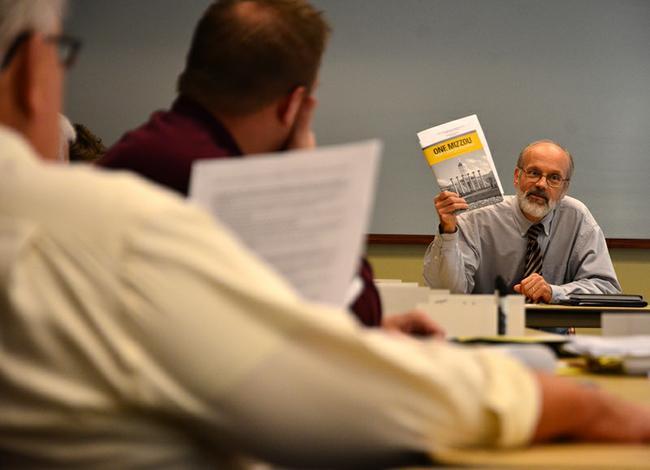Faculty Council reviewed the statement on Policy on Academic Freedom, Course Discussion and Privacy issued by the UM System Intercampus Faculty Council.
At the meeting Thursday, council members expressed concerns that the statement was too general and unclear.
The statement was released after a UM-St. Louis professor resigned when a student posted edited videos of his Introduction to Labor Studies course online. UMSL later concluded that the student’s account of the class, posted on Andrew Breitbart’s Big Government blog, was misleading, with videos taken out of context to make it look as though the instructors advocated violent union tactics.
After addressing the need for free discussion within academic courses, the statement says the “unauthorized copying, editing and redistribution of recordings of statements or comments in the course” is restricted unless a student obtains the permission of the faculty member leading the course.
Council members questioned whether the proposed policy would prevent students from taking and sharing notes and other class materials freely.
“Part of the problem is the vagueness of the idea of recording,” council member Clyde Bentley said. “If I hand notes to a friend that’s sick, is that a violation of this law? The way it’s written now, I’d have to give written permission to any student who wanted to distribute anything that’s from my class.”
Bentley said the policy had generated discussion among members of the journalism school faculty who were concerned about its restrictions on information sharing.
“Our general feeling is you don’t assure the free flow of information by restricting how the information is disseminated,” he said. “As a society, you look at how it is used. We have libel laws. We have various rules that pertain to the misuse of information.”
Council member Katherine Reed raised concerns about whether the policy restricts courses that encourage students to use Twitter to spread classroom material. Reed said the council should work to address the issue through means other than a written statement.
“It’s dishonest to take a statement out of context,” she said. “I think we could find a way to incorporate that into an academic dishonesty policy. “
Council member Leona Rubin said she felt the document did not prohibit students from using class materials for academic purposes.
“I think it’s not unauthorized unless I say it’s unauthorized,” she said. “If my students take my lectures, if they take notes, if they take video, and they share it with someone who missed class, I don’t care. It’s not unauthorized as far as I’m concerned. I don’t think this document prohibits students from doing what they always do and what they need to do and learn and study.”
The council said the policy is also meant to protect the images and words of students.
“What students say are often not disseminations of information, they’re perspectives,” council member Vanya Krieckhaus said. “That’s stuff that you don’t want to have broadcast to the world. That’s the kind of stuff I think we need to protect.”
Rubin said the policy is partially meant to inform students of their responsibility to be honest.
“We want to protect students, but the material from the labor studies class came out of that class by a student,” she said. “I think our legal counsel would like students to be responsible as well. They want students to know that is inappropriate behavior.”
Faculty Council Chairman Harry Tyrer said he would relay the council’s comments to IFC.








